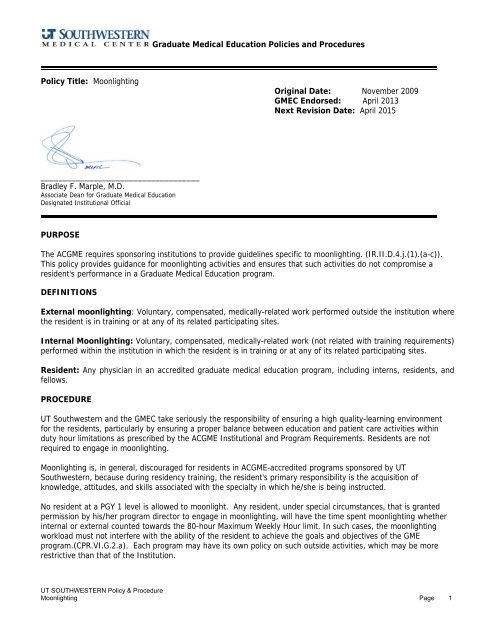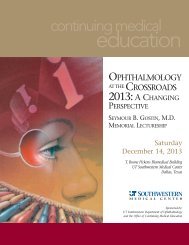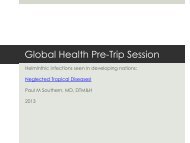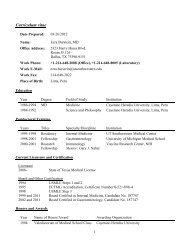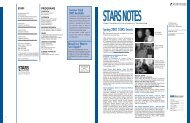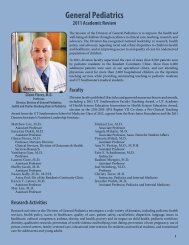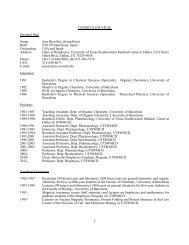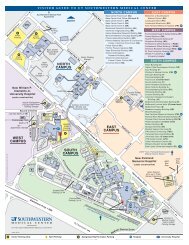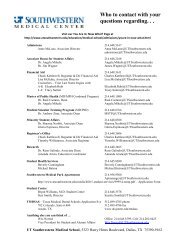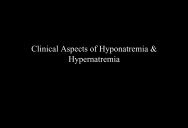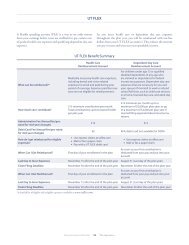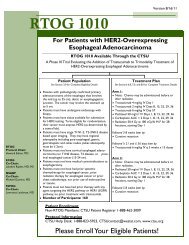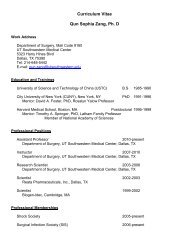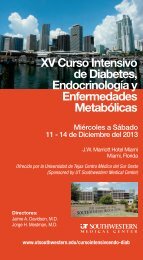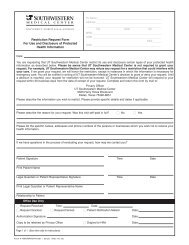Moonlighting Policy - UT Southwestern
Moonlighting Policy - UT Southwestern
Moonlighting Policy - UT Southwestern
Create successful ePaper yourself
Turn your PDF publications into a flip-book with our unique Google optimized e-Paper software.
Graduate Medical Education Policies and Procedures<strong>Policy</strong> Title: <strong>Moonlighting</strong>Original Date: November 2009GMEC Endorsed: April 2013Next Revision Date: April 2015____________________________________Bradley F. Marple, M.D.Associate Dean for Graduate Medical EducationDesignated Institutional OfficialPURPOSEThe ACGME requires sponsoring institutions to provide guidelines specific to moonlighting. (IR.II.D.4.j.(1).(a-c)).This policy provides guidance for moonlighting activities and ensures that such activities do not compromise aresident's performance in a Graduate Medical Education program.DEFINITIONSExternal moonlighting: Voluntary, compensated, medically-related work performed outside the institution wherethe resident is in training or at any of its related participating sites.Internal <strong>Moonlighting</strong>: Voluntary, compensated, medically-related work (not related with training requirements)performed within the institution in which the resident is in training or at any of its related participating sites.Resident: Any physician in an accredited graduate medical education program, including interns, residents, andfellows.PROCEDURE<strong>UT</strong> <strong>Southwestern</strong> and the GMEC take seriously the responsibility of ensuring a high quality-learning environmentfor the residents, particularly by ensuring a proper balance between education and patient care activities withinduty hour limitations as prescribed by the ACGME Institutional and Program Requirements. Residents are notrequired to engage in moonlighting.<strong>Moonlighting</strong> is, in general, discouraged for residents in ACGME-accredited programs sponsored by <strong>UT</strong><strong>Southwestern</strong>, because during residency training, the resident's primary responsibility is the acquisition ofknowledge, attitudes, and skills associated with the specialty in which he/she is being instructed.No resident at a PGY 1 level is allowed to moonlight. Any resident, under special circumstances, that is grantedpermission by his/her program director to engage in moonlighting, will have the time spent moonlighting whetherinternal or external counted towards the 80-hour Maximum Weekly Hour limit. In such cases, the moonlightingworkload must not interfere with the ability of the resident to achieve the goals and objectives of the GMEprogram.(CPR.VI.G.2.a). Each program may have its own policy on such outside activities, which may be morerestrictive than that of the Institution.<strong>UT</strong> SO<strong>UT</strong>HWESTERN <strong>Policy</strong> & Procedure<strong>Moonlighting</strong> Page 1
Graduate Medical Education Policies and ProceduresWithout compromising the goals of resident training and education a program director may allow a resident tomoonlight if all of the following conditions are met:• The resident is not at the PGY 1 level• The resident is in good standing in the program. The resident is licensed for unsupervised, independent medical practice in the state where themoonlighting will occur.• The resident has obtained professional liability (including "tail" insurance), and workers' compensationcoverage from an outside employer. Professional liability insurance is provided by the U.T. System MedicalLiability Self-Insurance Plan and/or by Ascension Health only for those activities that are an approvedcomponent of the training program. There is NO coverage for professional activities outside of the scope ofthe residency program. The responsibilities in the moonlighting activities are delineated clearly in writing and are prospectivelyapproved in writing by the resident's program director. Written documentation of the moonlighting activity is filed with the resident records and is available forGME Committee monitoring.The resident's performance in the training program must be monitored for the effect of these activities, andadverse effects should lead to withdrawal of permission to engage in moonlighting.Residents on a J-1 visa cannot moonlight. <strong>UT</strong> <strong>Southwestern</strong> does not provide professional liability coverage formoonlighting activities.<strong>UT</strong> SO<strong>UT</strong>HWESTERN <strong>Policy</strong> & Procedure<strong>Moonlighting</strong> Page 2


